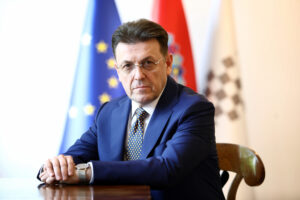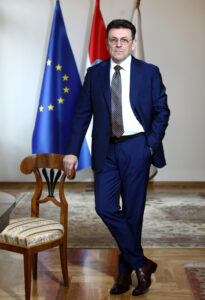HGK has strategically oriented itself towards five areas of interest to its members: sustainability, green and digital transition, internationalization of business, the future of the workforce and food safety.
HGK currently offers more than 60 services and products to its members, which, in addition to large and medium-sized members, can also be used by voluntary members to a certain extent, Luka Burilović, President of the Croatian Chamber of Commerce, told Diplomacy&Commerce. In the future, we must focus on creating a long-term regulatory and financial framework for faster, more efficient and greater energy self-sufficiency. These are significant investments that can simultaneously create demand for new industries and jobs, adds Burilović.

- HGK went through some form of a reform and manner of functioning. What are the benefits of this reform when it comes to the relationship between the institution and the businessmen?
The transformation that HGK is in is a long-term and by no means easy process, and this is especially relevant when we are talking about a 170-year-old institution. It forces us to get out of our comfort zone, to erase from our heads most of the previous patterns of thinking and working – and to be persistent, creative and armed with knowledge enough to design new ones. One of the key changes that turn us more strongly towards the market is the introduction of the position of Business Relationship Manager, which represents a much more personal approach to members and enables us to understand the situation and needs on the ground in a timely manner. At the same time, a member of the Chamber has a constant contact/expert whom they can turn to for anything they need. But we are just getting warmed up. We have to be even more agile, even more focused in the activities we do. Numerous initiatives and conferences were launched to facilitate the transition for businessmen and increase the resilience of the economy. Our work in the Chamber is as important as our involvement in helping any of our members, and even the economy as a whole. This is the only thing that matters and on the basis of which we can further emphasize the purpose of the Chamber, which is to strengthen and promote the resilience of the Croatian economy.
- In what ways and through which programs does HGK provide support for its members and the economy in the times of crisis that we are living in?
The Chamber offers its members assistance in doing business, professional advice, legal advice, assistance in doing business abroad, help and advice for EU funds, help in finding a foreign partner, organization of targeted visits to foreign fairs, etc. In addition, the Chamber also has some public powers and a conciliation center. New services were also presented, such as the price index of construction materials, HGK puls macroeconomic analysis review, ESG Academy, and we also participate in several projects that are co-financed from EU funds. Back in 2018, we launched the Digital Chamber Project as an online platform for business support. The Digital Chamber currently has 70,000 users, and it reduces paperwork and saves time and money for entrepreneurs. Let’s take for example the topic of sustainability and accelerated green transition in the year of the war in Ukraine and the energy crisis. This is not a trendy topic, but a serious and systematic strengthening of our resistance to future crises and shocks. This year, HGK organizes the fourth consecutive edition of the Let’s Support Sustainability (Podržimo održivo) Conference, which regularly gathers around 300 representatives of the business and public sector, scientific and educational institutions and associations, who get the opportunity to be inspired and learn from some of the world’s biggest authorities on sustainability. We also have an ESG Academy in our country, with which we want to bring this topic closer to the real sector, and from this year, a complete national system for evaluating the sustainable practices of our companies, ESG rating HGK, and we will present awards to the best of them. We regularly come out with new analyses, which follow the pulse of global and domestic economy according to key parameters, and provide clear guidelines on how the Croatian economy can make the best use of its potential. This year, we continued to advocate the interests of our members in some key topics. In March, HGK and its Association of Renewable Energy Sources presented a Position Paper, a document that summarizes and analyzes the biggest administrative obstacles in the development of renewable energy sources and offers proposals for solving them. After we pointed out to the problems, significant developments have taken place and two regulations have been passed that are extremely important for the business of this sector.
- The introduction of the euro and the entry into Schengen this year have changed the Croatian business sector in many ways. What are your experiences and which segment was most affected?
With Croatia’s entry into Schengen and the Eurozone, we have achieved two of the most important foreign policy goals that we set out by joining the European Union. How important this is was seen in the second half of last year, when we were not forced to raise reference interest rates in order not to mitigate the depreciation of domestic currencies. Schengen simplifies the exchange of goods, the flow of people, makes our border counties more accessible to investors from Schengen countries near Croatia, and our economy more competitive. Logisticians and carriers have a direct benefit from entering Schengen because their business costs are dropping: no more waiting at the Slovenian and Hungarian borders, i.e., that waiting time is now spent driving. It is estimated that the direct benefit of entering Schengen for more than 5,000 international road carriers in Croatia will be over 110 million euros on an annual basis. Along with our citizens who will travel even more easily within the borders of the Union, the biggest winner is certainly tourism, considering that guests from European countries make up our most important and richest market.

- International cooperation of the Chamber is one of the key functions, and the transfer of knowledge and experience is very important for progress. With which countries has Croatia recorded the greatest growth in international cooperation and in which areas?
About 15 percent of Croatian companies export, i.e., sell goods and services outside Croatia, and we at HGK are intensively working on ways to increase that number. The single EU market is the most important market for Croatia, and trade with EU member states in 2022 accounts for about 69% of total exports, which increased by 33% compared to 2021. Our largest foreign trade partners from the EU are Italy, Germany, Hungary and Slovenia, with Italy leading the way with a share of about 12% of total exports and an increase of about 23% compared to 2021. Bosnia and Herzegovina, the USA and Serbia are the most important partners outside the EU. Last year, trade with third countries accounted for about 31% of total exports, which, compared to 2021, increased by about 28%. The processing industry has the greatest influence on the increase in export and import, it achieved an increase in exports by about 22% in 2022, followed by the production of food products with a share of about 8% in total exports and an increase in exports by about 24% compared to 2021. An important item in Croatian exports is certainly the exchange of services with foreign markets, where we achieved a surplus of 14 billion euros in 2022, mostly with the most important partners, Germany, Austria, Italy and Slovenia. In this segment, for example, revenues from the export of services with Germany increased by 34% compared to 2021, and with Austria by as much as 53% compared to the previous year. In addition to traditional markets, where there is still room for more stronger positioning of our companies, products and services, the companies are showing increasing interest in stepping into markets that have not been their focus traditionally, such as the USA, the Middle East, South America and Turkey, therefore we adapt our activities primarily to the interests of the members. Exporting is a challenge in itself, and a successful and long-term presence in a market and a sustainable business require planning, preparation and connecting with verified stakeholders and partners in a country. It is an area in which HGK tries to support its members as much as possible, through the organization of bilateral and multilateral events, participation in internationalization projects such as the European Entrepreneurial Network (EEN) and the opening of representative offices in target markets.
- How would you rate the business year coming to an end and what are the greatest challenges for the upcoming period (labor shortage, outflow of people abroad, increase in wages…)?
Today, the Croatian economy is significantly more resilient than ever before. We recovered very quickly from the drop in GDP during the pandemic, partly due to the deleveraging of the economy after 2008 and certainly due to entry into the EU, which our exporters took advantage of very well. Today, Croatia is at the institutional core of the EU, and by 2029 we can use as much as 25 billion euros from EU funds, more than half of which is intended for investments in ‘digital’ and ‘green’. Entry into Schengen and the euro area are additional flywheels for the economy, but like the rest of Europe, we are adjusting to higher energy prices and the re-establishment of supply chains. About ten years ago, the main concern of businessmen was how to adapt and not fail in the extremely competitive European market, and today the focus is on entering third markets and nearshoring, which is current due to Europe’s need to bring some part of industries back to the continent. Nevertheless, in order for the industry to gain new momentum, a well-thought-out industrial strategy is needed along with the predictability of public policies. The workforce is an extremely important issue, of course. We have one group of activities with which we solve current problems, like in construction sector, for example, where this is very important to us due to reconstruction after the earthquake, but also large infrastructure projects. Of course, I am referring to the import of labor. We need a long-term immigration policy and we need a long-term strategy in cooperation with the education system.
- In your opinion, what should be the main course of action of policy makers when it comes to strengthening the competitiveness of the Croatian economy?
We must focus on creating a long-term regulatory and financial framework for faster, more efficient and greater energy self-sufficiency. These are significant investments that can simultaneously create demand for new industries and jobs. That is why it is necessary to significantly simplify the regulatory framework and administrative processes, and this will be the focus of the Croatian Chamber of Commerce in the coming period. At the same time, models should be prepared that will stimulate investments in renewable energy sources and provide tax incentives for companies that will accelerate their path to energy self-sufficiency. At the same time, we must not forget about our agricultural policy, which, along with further consolidation, must include more innovations and technologies, in order to achieve the highest degree of self-sufficiency and competitiveness. Any increase in domestic agricultural production would not only improve the agricultural trade balance, but also reduce the inflationary pressures occasionally generated by the global agricultural market. The questions that we must continuously address are where Croatia is on today’s global map, as well as how Croatian companies deal with current challenges in internationalization, how quickly they adapt to new circumstances. How difficult it is to find new market niches in today’s conditions, as well as whether any new ones have opened. One thing is certain. Regardless of how the puzzle of the international business of Croatian companies looks like, promoting trade and investment must be our national priority.